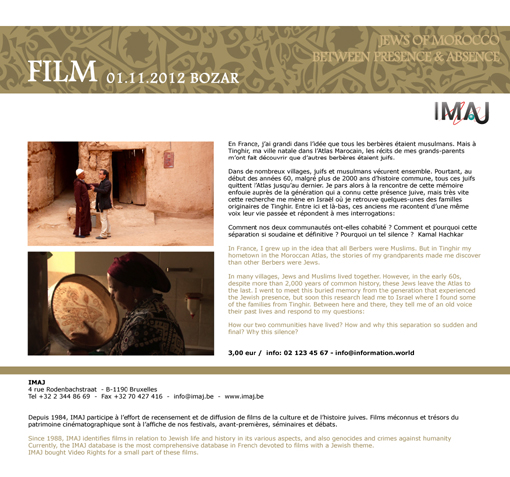
Les Juifs du Maroc
Entre présence et absence
Palais des Beaux-ArtsRue Ravenstein 23 - 1000 BruxellesInfo & Tickets 02 507 82 00
IMAJ & CCJM & Projet Aladin
Joseph Chetrit professeur émérite à l'Université de Haïfa, spécialiste de la culture et de l'histoire des Juifs en Afrique du Nord.
Ruth Grosrichard agrégée d'arabe, professeure à Sciences-Po à Paris.
Kamal Hashkar réalisateur du film “Tinghir Jérusalem: les échos du Mellah”.
Depuis le neuvième siècle au moins, les Juifs ont formé au Maroc de nombreuses communautés florissantes et actives dans le commerce intérieur comme dans le commerce transsaharien et international, qui ont pu se maintenir grâce à la coopération étroite et quotidienne avec leurs voisins musulmans, arabes et berbères. Leur apport à la littérature rabbinique et jurisprudentielle et à la création poétique juive ne s'est pas démenti depuis lors, et ce malgré des périodes de persécutions parfois très dures, comme sous la dynastie des Almohades aux XIIe-XIIIe siècles. Ces communautés ont été renforcées à la fin du quinzième siècle par l'arrivée de milliers de Juifs expulsés d'Espagne et du Portugal, dont les savoirs et les divers savoir-faire ont servi le Maroc dans la diplomatie, le commerce international, la bijouterie et d'autres métiers. Jusqu'à leur départ entre 1947 et 1975, les Juifs du Maroc ont constitué la population juive la plus importante du monde arabo-musulman. En 1956, ils comptaient près de 275.000 personnes. Aujourd'hui, 3000 Juifs seulement vivent au Maroc, à Casablanca principalement.
Malgré leur départ massif et souvent précipité, les Juifs du Maroc ont tenu à garder les liens qui les attachent à leurs lieux de naissance, à leurs connaissances parmi les Musulmans et à leur pays d'origine. Ils y reviennent chaque année par dizaines de milliers pour se ressourcer, visiter les tombes de leurs ancêtres et celles des nombreux saints qui y sont enterrés, se promener dans le pays et cultiver leurs lieux de mémoire.
Le débat qui suivra la projection du film de Kamal Hashkar tentera de démêler les paradoxes de cette absence et en même temps présence des Juifs du Maroc et de donner des éléments de réponse aux questions suivantes:
1/Quelles étaient les formes de coopération entre Juifs et Musulmans au Maroc?
2/Pour quelles raisons les juifs ont-ils quitté en masse le Maroc?
3/Comment a été ressenti à l'époque et comment est ressenti aujourd'hui au Maroc le départ des Juifs? Quel accueil y reçoivent-ils, ces nostalgiques du pays?
4/Que représente pour les Juifs du Maroc leur attachement à leur pays d'origine et quel rôle joue-t-il dans leurs nouvelles identités en dehors du Maroc?



